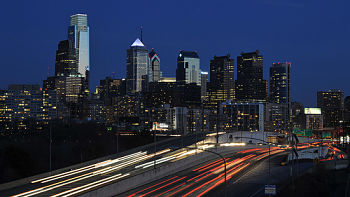
The new Pennsylvania law regulating transportation network companies (TNCs) like Uber and Lyft contains many fees for the new industry. Similar to Uber’s agreement with Montreal, ride-hailing companies have shown an ability to accept new fees and taxes, just don’t require them to fingerprint their drivers (unless you’re New York City).
Pricing regulations for ‘rideshare’ companies
The act legalizes three pricing models for TNCs. They can:
- offer free rides,
- suggest donations, or
- charge fares.
Obviously, most TNCs practice the third model. But Pennsylvania allows other models for you hippies that might want to ask for donations.
Confusing emergency pricing cap
Uber has been criticized for gouging customers during emergency situations, dating back to 2012 when Hurricane Sandy hit the Northeast United States. Rising water from the (meteorological) storm surge forced the closure of New York’s subway system. With increased demand for rides, Uber’s dynamic pricing model, which it calls surge pricing, raised rates dramatically. (Lyft uses a similar method, which it calls Prime Time.) Theoretically, the increased rates get drivers off the couch and behind the wheel.
As Sandy approached New York, rising water from the (meteorological) storm surge forced the closure of New York’s subway system. With increased demand for rides, Uber’s prices rose dramatically. Many customers felt exploited. Sandy presented Uber with a PR disaster.
This Tweet dating back to the time of the hurricane makes fun of Uber’s emergency pricing.
New UBER deal: Storm Surge Pricing. The higher the winds are, the higher our pricing goes!
— Maurice Rahmey (@mrahmey) October 29, 2012
Following Hurricane Sandy, Uber and the Attorney General of New York reached an agreement regulating pricing during emergency situations. Pennsylvania borrows this language from New York when it regulates emergency pricing. Unfortunately, the limit is not a simple cap–say 2x, or 3x the base fare. According to law, the network must limit the multiplier of the standard fare to the fourth highest surge rate charged in the previous 60 days. Unfortunately, there is no way for a customer to gauge such a rate during the emergency.
Prices, either emergency or standard, are not subject to review by the state, except after a customer complaint is received, and then only on a case-by-case basis.
Application Fee for TNCs
Transport network companies must obtain a license from the state.
The application fee is $50,000, and, if declined, all but a $2,500 processing fee is returned. No third parties can object to an application.
Uber and Lyft, which currently operate in Pennsylvania, have 45 days to apply for a license. They can operate while an application is pending.
‘Rideshare” Company Access to Airports in Pennsylvania
The law does not require airport authorities to allow ‘rideshare’ companies access to airports for passenger pick-up and/or drop-off, but it does not preclude them from reaching agreements with TNCs.
If the airport allows TNCs, this act puts on an additional fee of $0.40/ ride (pick-up or drop-off) in addition to any fees negotiated by the airfield. Those forty cents go to the county in which the airport is located.
Annual Assessment Fee for TNCs
The law creates a Transportation Network Service Fund into which will pour annual assessments, scaled according to the size of the company.
| Pennsylvania Ride-Hailing Company Assessment | |
|---|---|
| Tier 1 TNC (more than 10,000 active drivers) |
$2,000,000 |
| Tier 2 TNC (7501-10,000) |
$750,000 |
| Tier 3 TNC (1,001-7,500) |
$500,000 |
| Tier 4 TNC (1-1,000) |
$100,000 |
Active drivers have taken a ride within the last 90 days.
In addition, on July 30th of each year, the TNCs will pay 1.7% of their gross receipts, minus the annual assessment. The total assessment paid will be capped according to tiers.
| Tier 1 TNC | $4,000,000 |
| Tier 2 | $3,500,000 |
| Tier 3 | $3,000,000 |
| Tier 4 | $3,000,000 |
Special Philadelphia TNC tax
Finally, lawmakers included a tax designed specifically for Philadelphia. Typical of lawmakers, they don’t say it directly. They set aside the money for a “City of the First Class,” which is defined by statute as a city with a population of one million or more. There’s only one city that large in Pennsylvania. It’s Philly. Sorry Pittsburgh, but Philadelphia is Pennsylvania’s only City of the First Class.
For rides originating in Philly, 1.4% of the gross fare will go to the city, via the state treasurer. Two-thirds will go to the School District of Philadelphia, while the City Parking Authority, which enforces taxi regulations, receives one-third.
The state reserves the right to inspect company records, but this information will be protected from disclosure to an outside party through a right-to-know law.
